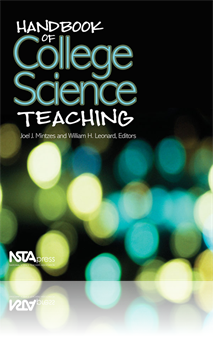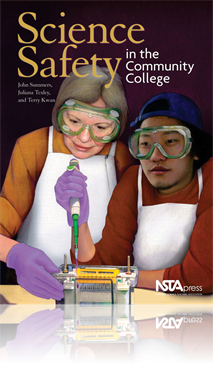All Book Chapters
Book Chapter
Making Choices About Teaching and Learning in Science
What exactly do we mean by civic engagement? Does it imply a way of thinking about knowledge in a democratic society? Or does it require personal action in a civic context? For the readers of this handbook, what relevance does civic education have fo...
Book Chapter
Science and Civic Engagement: Changing Perspectives from Dewey to DotNets
A prominent theme in current discourse about U.S. higher education is the goal of "civic" education. In this chapter, the author explores three related perspectives on civic engagement. First, he examines how John Dewey viewed the relationship betwee...
Book Chapter
Using Research on Teaching to Improve Student Learning
This chapter describes general procedures for research on college and university science teaching, examples and benefits of several very different research models that can be used, examples of published studies, and suggestions on how to get your res...
Book Chapter
Experiential Learning in a Large Introductory Biology Course
This chapter describes and discusses effective approaches to teaching a large, two-semester introductory college biology course at Syracuse University. The course offers many unusual and creative experiences that enhance student learning and create a...
Book Chapter
Strategies for Interactive Engagement in Large Lecture Science Survey Classes
This chapter describes some things that faculty in large-enrollment introductory astronomy courses do to intellectually engage students in learning the material during class time. These strategies are easily transferable to other scientific disciplin...
Book Chapter
Undergraduate Research in Science: Not Just for Scientists Anymore
Institutional measures, such as the fraction of undergraduate research (UR) students who later pursue a PhD in science, do not reflect the value of UR as an educational and personal growth experience for students; moreover, little data exist to justi...
Book Chapter
Concept Mapping in College Science
A concept map is a two-dimensional, hierarchical node-link diagram that depicts the most important concepts and propositions in a knowledge domain. Concept mapping helps students and faculty recognize the difference between meaningful and rote learni...
Book Chapter
Peer Instruction: Making Science Engaging
Peer Instruction (PI) is an interactive approach that was designed to improve the learning process. This approach provides students with greater opportunity for synthesizing the concepts while instructors get timely feedback that can help focus the i...
Book Chapter
Open Laboratories in College Science
One viable alternative to the conventional, regularly scheduled laboratory session is the open laboratory concept. In this chapter, the authors use the open laboratory system developed at Eastern Kentucky University as a case study to provide insight...
Book Chapter
Setting the Scene: Safer Science in a Drive-Through Learning Community
Developing a responsible and safe introductory community college laboratory science program is a challenge. The subject matter is complex, requiring cerebral, technical, and mechanical skills. The prior knowledge and experiences of students are diver...
Book Chapter
The Kitchen Sink: A Potpourri of Teaching Tips
The 21st century has brought new technology as well as new concerns. After covering traditional safety categories in previous chapters, this chapter discusses items that fit nowhere else, such as internet use, allergies, and Standard (Universal) Prec...
Book Chapter
Live Long and Prosper: And Remember You Are Responsible
Today's society is quite litigious, and many people place blame on instructors for factors well beyond the instructors' control. This chapter shares tips on how professionals can "Live Long and Prosper" by protecting themselves as well as their stude...
Book Chapter
Communities of Learners: Promoting Science for Every Citizen
This chapter looks at ways to accommodate diverse needs and goals—not only to make a program safer but also to help everyone involved achieve the goals that brought them to the community college campus. A number of resources are listed at the end o...
Book Chapter
Where Science Happens: Equip Your Lab for Safety
Many college buildings are aging and with increases in enrollment, some administrators are forced to use stopgap scheduling or emergency housing. This chapter discusses space and equipment, while highlighting the importance of facilities and how they...
Book Chapter
Finders Keepers: Essentials of Safer Storage
More than any other community college instructional disciplines, laboratory sciences require safe and secure storage facilities. This includes storage within the classroom/lab, as well as dedicated storage areas adjacent to but separate from the clas...




